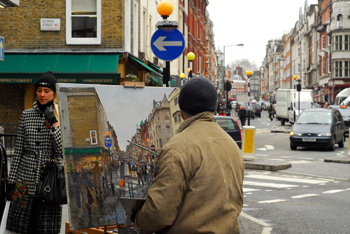Art has been hit hard by the financial crisis, with an increase in tuition fees and cuts in funds. Katarina Marinkovic talks to emerging European artists who share their experiences and reflect on how to face the current climate.
Being an artist has never been known as quick way to make millions. But with the increase of tuition fees and restrictions in funding, the arts are becoming an increasingly unlikely source of income. If you are Tracey Emin, of course, surviving on art alone is hardly a problem. Unfortunately, most European people working in the creative sphere face a struggle to make a living.
Austerity cuts have led to a lack of funding, with the arts council England (ACE) having its budget cut by 29.6%. According to ACE, more than 200 arts organisations have lost their funding, leaving artists and art institutions worried about the future of their practises. Attacking the arts, which are vital to the UK’s economy, could be considered a destructive move.

Higher fees, less funds
“Some of our biggest industries in the UK are creative. Graphic design, illustration, fashion, TV production… We are a nation with a culture of creative industry and we should be supporting our artists. The arts fuel a high percentage of our economy, without the wealth of theatres and galleries in the capital, our tourism would surely suffer,” says Tinsel Edwards, a practising artist from London.
According to UNESCO, the UK is the world’s largest exporter of cultural goods. The arts provide over 2 million jobs and are mentioned by 8 out of 10 tourists as a reason for visiting. Yet recession has hit the arts hard. More than 100 staff are to be axed from ACE in order to make savings demanded in the spending review. Some, like Matthew McHugh, a singer in a wedding/events band from Manchester, believe that cuts will not stop artists from earning a living. “If you are ruthless enough to name your price, taking into account the travelling costs, there is always the possibility of getting decent, constant paid work.” But can up-and coming artists demand to be paid at an acceptable level? Many of them are double jobbers, juggling between their art and various part time jobs, simply because they can’t make a living from their practice.
Andrew Gorman, a musician from London, says he would probably just get by if he didn’t have other jobs: working in administration and teaching mathematics. “Administrative stuff is a bit dull and it leaves me less time to write and perform music, but on the up side I get to interact with people whilst doing these jobs. Writing music is a bit lonely; it is just you and your work, so I do enjoy a change. And everything we experience can be used as inspiration, meaning that my music can benefit from my other jobs.”
Portugal’s art scene too has been hit hard by the recession, with arts funding reduced to mere 0.37 per cent of the annual budget. Porto Book Fair has been cancelled this year for the first time in a century, leaving both writers and public disappointed in their country’s cultural prospects.
BBC News run a story on the Portuguese photographer Daniel Rodrigues, who has been unemployed since 2012 and was forced to sell his camera to survive. He later won the prestigious World Press Photo Award for the photo he took while doing volunteer work in Guinea Bissau, and the media attention he received ultimately led to a bank purchasing him new equipment. Rodrigues described those events as an embarrassment for his country and said that many artists are leaving Portugal due to lack of financial support.
He kindly agreed to share his views on the state of Portuguese art scene. “Being an artist in Portugal is very difficult. In the current economic climate, making a living from photography is close to impossible. I would say that this is the case for most European countries. No one is willing to invest in photography, they are busy clearing the national debt.” Rodrigues believes that governments should pull their weight in offering artists more support.
“More importance should be given to the arts. Artists are often neglected during tough economic times and even though there are no quick fixes, even simple initiatives like more exposure, lectures and other means of promotion would make a big difference.”

Austrian artists are also finding to be amongst the few lucky Europeans who get enough support from the government. “Austria is probably one of the best European countries for artists, along with Germany.”, says Nikola Golocevac, a musician from Graz. He says that Austrian and German governments invest more than enough in the arts sector and help young artists to develop their creative projects. “This is probably due to both countries having a rich cultural tradition and good standard of living. In Austria, people attend cultural events almost every day. Education is very affordable too, making it easier for students to choose art.”
In the UK, however, increase of tuition fees means that not only a lot of people will not be able to afford university, but also that, when facing a prospect of graduating in recession and ending up with a depth and a degree in art, many will think twice before pursuing a career in the arts.”I was in the last year of my MA when they raised the tuition fees”, says Andrew Gorman. “If I were to enrol with the new fees, I would probably give up” He says that the many arts students are forced to miss out on education simply because they can’t afford to go to university and are unable to finance it through their practice.
European graduates also face the prospects of unpaid work and internships, which makes a career in the arts even less appealing and favours only those who are rich enough that they can afford to work for free.
A new path for creation
An open letter has been signed by 240 European students, recent graduates and working professionals who believe that unpaid internships increase social inequalities and hinder young Europeans who cannot afford living costs and rent without being given remuneration for their work. While most artists agree that cuts have made it even harder to make a living from the arts, some are optimistic about coping with recession. A vast number of art institutions are coming up with projects to offer support to artists and those who would like to embark on a career in the arts.
Creative Europe, a 1.8 billion Euro arts and culture funding initiative, was started in 2014 to help millions of Europeans receive the financial support, train professionally and reach new audiences.
There are institutions, such as The Musicians Benevolent Fund, which help young artists develop their talents. “In The Musicians Benevolent Fund, we administer and run several funding schemes to support musical artists with important development opportunities”, says Elizabeth Sills, support assistant. The fund has awarded financial grants ranging from £1000 to £4000 to 28 talented young musicians across a variety of genres. They organise many fundraising events to help support musicians and also have a team of volunteers to offer social support to retired musicians.
Camden Arts Centre has come up with a project called How can art?: “The project’s main aim is to create space for young people to still find ways of exploring the arts with a contemporary arts space. We have several artists working for us and try to open up a dialogue between students and artists to introduce aspects of contemporary practice and the possibilities that lie within the arts”, says Nisha Matthew, Education Officer at Camden Arts Centre.

For Kevin Pople, a painter from North Wales, getting work in the tough economic times is not an impossible mission. “I don’t fear the cuts; I knew exactly what I was getting into when I signed up for the degree. I strongly believe I can figure out a schedule to bypass the wading economic downturn. All we have got to do as artists is persevere.”
Michael Dan Archer, sculptor and lecturer at Loughborough University School of Art and design says he teaches his students about ways of finding employment, applying for exhibitions and setting up artists led collectives. “Of course it is difficult to get started nowadays, but many of my students are surviving as artists, working in Public Art, Gallery Administration, curation and art therapy. I do acknowledge the difficulty of working in a recession and the way it has affected opportunities, and I teach my students how to promote their work in difficult times.”
The fact that jobs in the arts are underpaid and marked with uncertainty means that a lot of European artists struggle to make ends meet and have to constantly deal with rejection, which can take an emotional toll.
Angus Deuchar says that artists need to be aware of the cruel side of the industry and have to be able to deal with disappointment, which, in this type of career, is inevitable. “Not working and not getting paid is the worst. An artist has to be very careful that their whole self-worth is not wrapped up in what they do, because there can be several highs and several lows in an artistic career, and sometimes not much in between. You need to find the middle ground to stay sane.”
Tinsel Edwards says that rejection can be hard and at times it makes her feel like giving up. To avoid it, artists need to develop different skills. “At the same time as actually making art, artists need to be determined and focused, self-motivated, good business people, proactive with their marketing, organised… It is a lot of jobs in some ways,” says the painter.
Making a living from the arts is a challenge for most, despite the celebrated status of Europe’s creative industries. Not enough investment in the arts leaves both art institutions and artists vulnerable, thus less able to produce good art. There are no quick fixes, but a long-term solution may be changing the way art is perceived by both artists and the founders. Self-employed artists are entrepreneurs of their own kind and as such affected by the same factors as other businesses and services. Building reputation, image and credentials are crucial for advancing on the career ladder. Cultivating business relationships and being proactive, associating with the people in the industry, giving and taking are the fundamentals of any business survival. While encouraging artists to develop more business acumen, governments should not forget that art is not made for profit. The values and principles behind the arts are much more humane, personal and significant than those in businesses. But if artists make themselves visible and take the lead, proving to for-profit entrepreneurs that art is meaningful and truly integrated in our everyday lives, perhaps many, just as Tracy Emin and others have, will be able to make a living from the arts.
Cover photo: Darren Stone; CC BY-SA 2.0 (Flickr)




